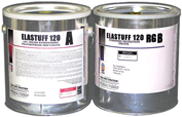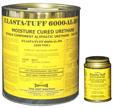Home > Using our Polyurethanes - Types of Polyurethanes & Advantages
The Rot Doctor™ takes surface protection a step further with some excellent polyurethanes… all compatible with our epoxies.
Quick click to:


Polyurethanes are polymer compounds, as are epoxies. As commercial products, polyurethanes are more versatile and form a much broader group than epoxies. Polyurethane products you are familiar with include high and low density foams, sealants, surfacing compounds, some elastomeric liquids, sport shoe soles, molded structures such as auto body/interior parts, truck bed lining, golf ball coatings as well as many others.
Our interest in polyurethanes comes from their bonding affinity with epoxies. We were looking for surfacing elastomeric liquids that were flexible, waterproof, almost indestructible, and could be used on wood, fiberglass, and concrete. Applications for these polyurethane compounds would include home decks, stairways, boat decks and hulls, walkways, ramps, garage floors, patios, cement blocks, tennis courts, swimming pool decks — whatever needed waterproofing or sealing from the weather and once in place would stay there indefinitely.
We found what we were looking for.
Types of Surfacing Polyurethanes
Surfacing polyurethanes can be very generally divided into those that are composed of 100% solids, and those that are diluted, and into those that are aromatic and those that are aliphatic.
100% solids polyurethane coatings are usually composed of an isocyanate-rich solution and a polyol-rich solution. There are no solvents to dissolve or dilute any of the resins, and there are no added fillers. A fast and exothermic chemical polymerization takes place and a very strong film is formed. Polyurethane coatings that are less than 100% solids are simply not as tough.
Almost all 100% solids polyurethanes are aromatic, meaning that they are based on aromatic isocyanates and polyether polyols. They are thick, flowing, and very strong, but will eventually be surface-degraded by UV light, as are un-pigmented epoxies. If aromatic polyurethanes are to be used outdoors, a topcoating is usually applied for color and UV protection. The topcoatings can be another polyurethane (usually aliphatic), acrylics, pigmented epoxy paints, or acrylic/epoxy combinations.
Aliphatic polyurethanes are based on aliphatic isocyanates and mostly polyester and/or acrylic polyols. The term “aliphatic” means open-chain (non-cyclic) hydrocarbons, and it can also apply to open-chain hydrocarbon subunits of larger organic molecules. The end result of being “aliphatic” is toughness, high resistance to UV degradation, and color stability. They apply as a thick film and will flow slowly in temperatures above 50°F. It is nearly impossible to get a easily workable 100% solids aliphatic polyurethane, and as far as we know impossible to have one that is of 100% solids and roller-grade. This is why roller-grade aliphatic polyurethanes are not 100% solids. Aliphatic polyurethanes can be used as topcoats for aromatic polyurethane bases or as coating compounds themselves. Although aliphatic polyurethanes are only about 70% solids, their particular chemistry makes them as tough or tougher than the 100% solids aromatic surfacing polyurethanes. For the products we are offering the tensile strength of the aliphatic polyurethanes is 3200 psi vs. 1500 psi for the aromatic polyurethanes, and tear strength is 350 lbs. per inch for the aliphatic vs. 200 lbs. per inch for the aromatic.
Advantages of 100% Solids Polyurethanes
- They are 100% solids, having zero or near-zero VOC’s (Volatile Organic Compounds)
- Will set at virtually any temperature, winter and summer
- Are nonflammable and solvent-free
- Superior adhesion without priming. They form a monolithic, seamless polymer sheet virtually fused with the substrate
- Strong resistance to gouging and abrasion
- Good flexibility and resilience, and will never become brittle
- Impermeable and highly resistant to chemical attack
- Can be applied in any thickness by brush or roller
- Are easily touched up if damaged
- Are nationally and internationally approved (UL, NSF, etc.)
Our Testing and What We Have Learned
Polyurethanes adhere particularly well to epoxies and polyesters. Polyurethanes are flexible and very strong and very long-lasting. What we wanted were surface coatings that would waterproof the surface and would adhere under the most adverse conditions, and that could be applied by roller or brush. These are not easy to find, but we did. We wanted to sell only the best.
When we found what we thought we were looking for we reviewed the technical specifications and visited the factory that manufacturers them. We saw them after severe test conditions, and on all types of surfaces.
The product tech sheets we show are developed from those of the manufacturer, who puts very stringent requirements on surface preparation for industrial application to a variety of substrates. They should be reviewed thoroughly before applying any of these products.
All of the products work very well indeed, with performance and durability linked directly to product cost. These are not the type of products you will find at retail outlets and they are substantially different from all normal paints or coatings. We offer some bottom line thoughts on each of the polyurethane products we carry, and encourage anyone considering using these products to e-mail or call us if you have questions.
